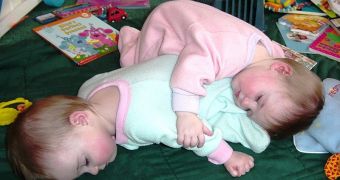Australian researchers from the University of Auckland discovered in a new study that babies as young as 13 months are able to detect different languages, and figure out that words are used differently in other languages. In a series of experiments the team conducted, infants did not generalize the rules of a language to another.
The team also found that the babies they analyzed were able to understand that adults from different linguistic communities used different terms to refer to the same object. Previously, scientists believed that this capability only formed much later on in life.
The investigation was led by UA researchers Jessica Scott and Dr. Annette Henderson, who also authored a new paper detailing the findings. The work is published in the latest issue of the journal Developmental Psychology, Science Blog reports. The experiments the team led involved babies being exposed to French and English nursery rhymes.
Each of them was first shown videos of actors singing the lullabies in their respective languages. Afterwards, a video showing the French actor picking up a new object and giving it a name was repeatedly shown. In another test, the second object was picked up, and given the same name as the first.
By 13 months old, “infants understand that people who speak different languages do not use the same words in the same way. This is the first evidence that infants do not indiscriminately generalize words across people,” Dr Henderson explains.
“This early appreciation might help infants by encouraging them to focus on learning the words that will most likely be shared by members of their own linguistic group. They understand that object labels have shared meanings among speakers of the same language,” she goes on to say.
The team was also able to discover that infants expect people who speak foreign languages to use basic rule consistently, such as not name an object with two different names. “This finding shows that infants appreciate that words are not shared by speakers of different languages, suggesting that infants have a fairly nuanced understanding of the conventional nature of language,” Henderson adds.
She explains that the popular view holding that babies learn language on their own, without active help from their parents, is wrong. While it is true that some passive learning does occur, babies also take an active interest in learning how to use the words of a language, and do so from a very tender age.

 14 DAY TRIAL //
14 DAY TRIAL //